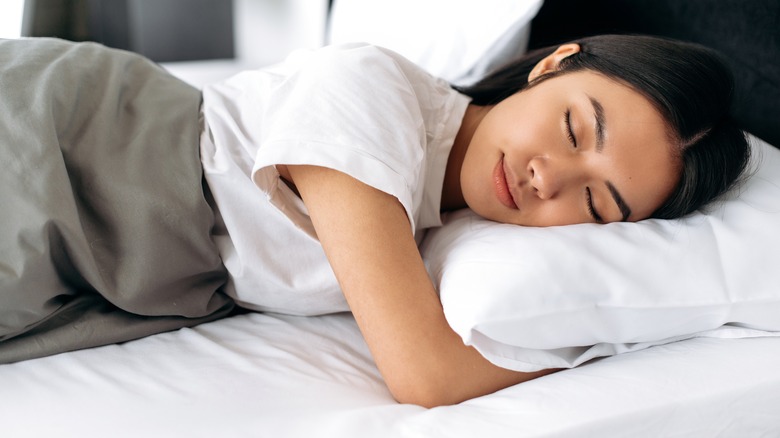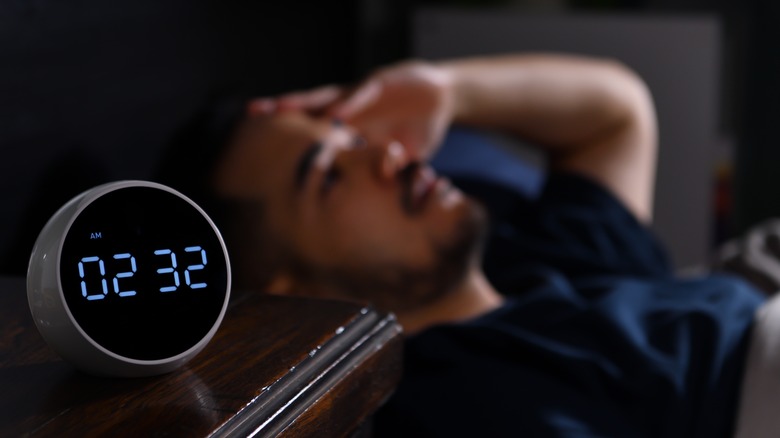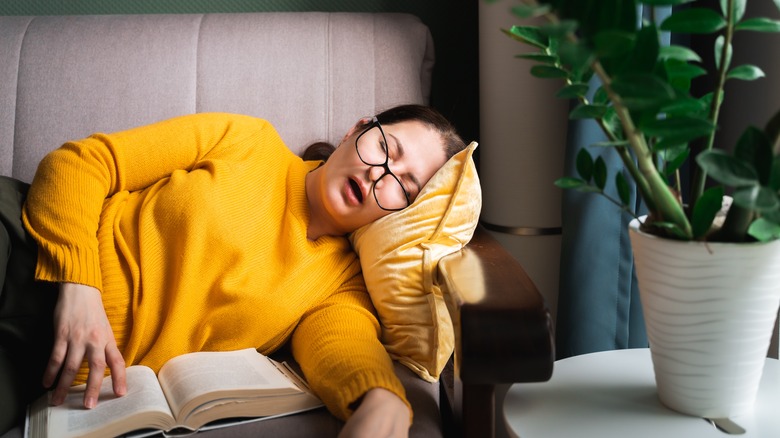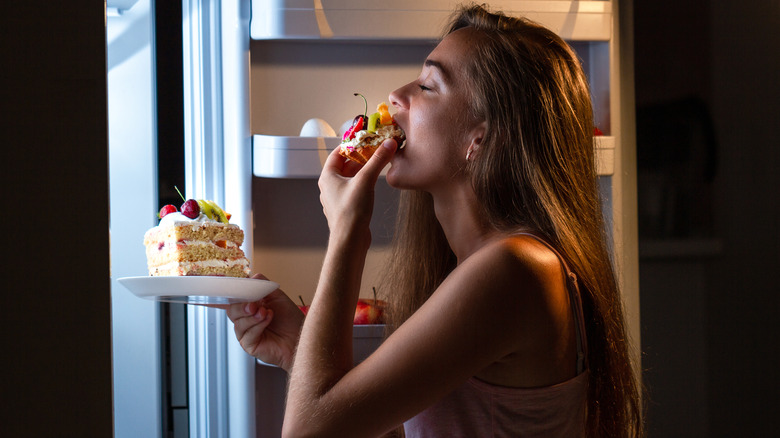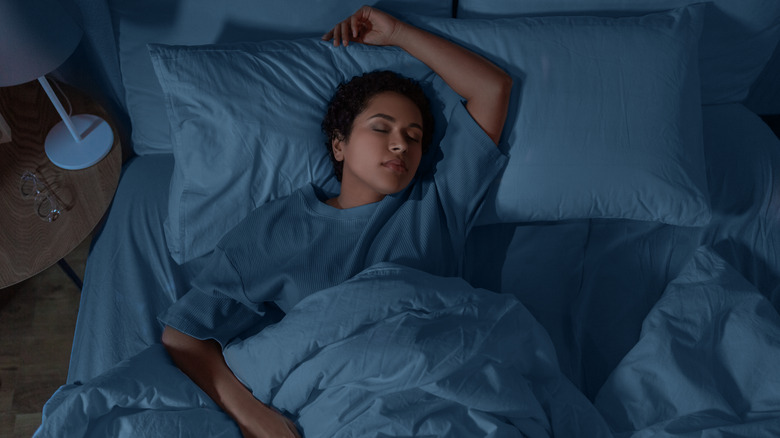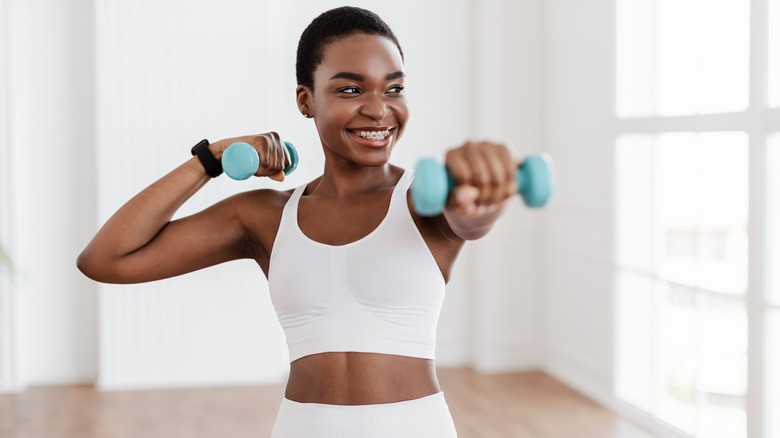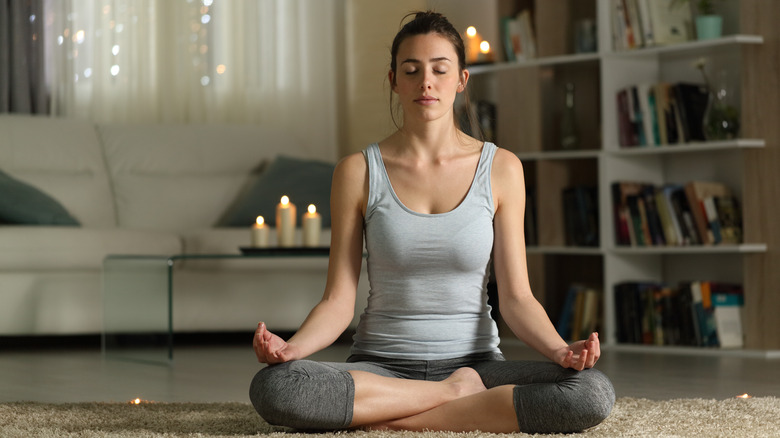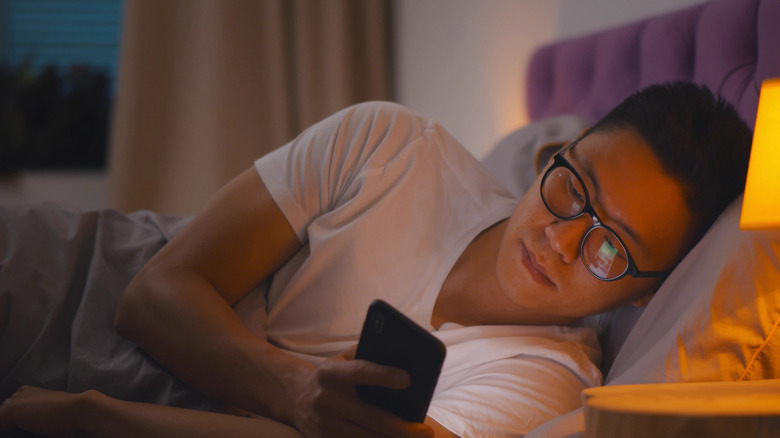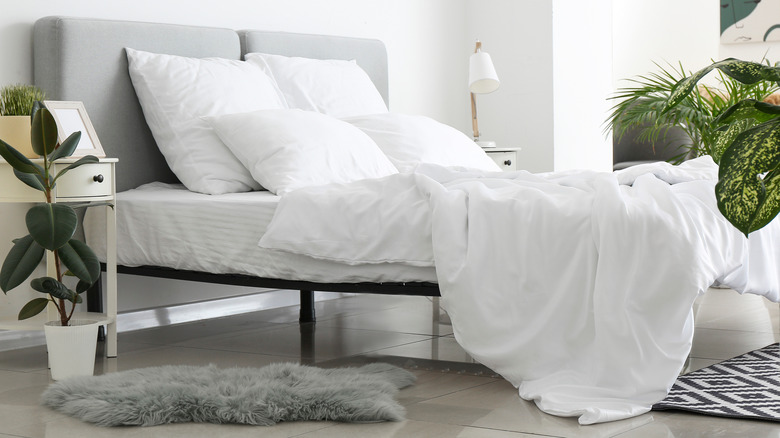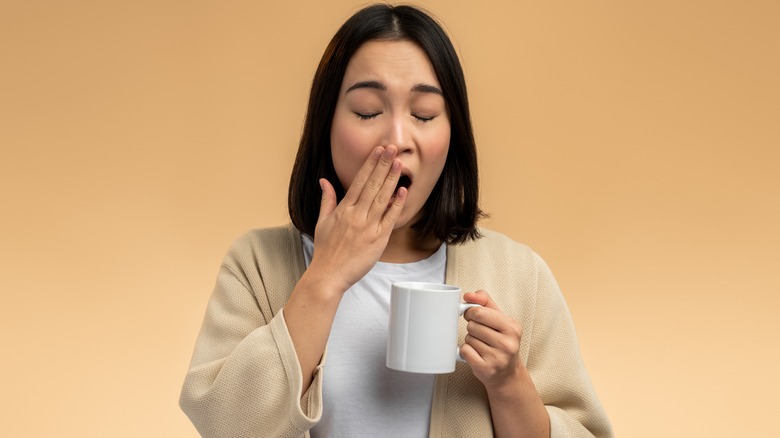Tips For A Better Night's Rest If You're A Restless Sleeper
Oh, sweet sleep: Every human on the planet needs it to function normally, yet it seems to evade us regularly when we need it most. There's nothing more frustrating than feeling exhausted all day only to jump into bed and be unable to sleep for most of the night.
According to Marishka K. Brown, director of the National Center on Sleep Disorder Research, this phenomenon is a global problem. "Poor sleep has been around for a long time," Brown told Livestrong. "If you don't sleep, you don't feel good." This is because sleep plays a crucial role in overall well-being — both mental and physical.
Dr. Abhinav Singh, facility director of the Indiana Sleep Center, says that sleep, alongside other healthy habits like exercise and eating well, form the foundation of overall health. Sleep largely determines how well you stick to healthy habits as well. "If you don't have good sleep habits, you're generally not going to eat well nor will you have the energy or motivation to exercise," Singh says. Ain't that the truth.
If a restful night's sleep seems like a faraway dream, don't be discouraged just yet. It turns out that what you do during the day and right before bed can have a significant impact on the quality of your sleep. Read on for tips to help put restless nights to bed for good — pun intended.
Have a consistent sleep schedule
The first thing you need to do (if restless nights just won't take their leave) is to establish a consistent sleep schedule. This will help your body recognize when it's time to wind down for sleep. The best way to establish this routine is to go to bed at the same time every night, and, most importantly, wake up at the same time as well, according to the NHS.
While we're all unique when it comes to sleeping habits and how many Zs we need to catch to feel our best, Dr. Ambrose Chiang, sleep specialist, told University Hospitals that we should all aim to get at least seven hours of sleep. And Michael Breus, also a sleep specialist, told Livestrong that it's important you choose a wakeup time you can stick to — even on weekends. This might look different for everyone since our genes play a significant role when it comes to ideal wake-up time, according to a 2019 article published in Nature Communications.
The article explains that DNA data gathered from almost 700,000 people showed that there are various genetic factors that cause people to be either night owls or morning people. While it might be tempting to rise later if you're a night owl, this is hardly ideal when you need to be at work early. Instead, it's recommended you choose a time that's realistic for you personally, and determine the time you need to go to sleep from there — then stick to it long-term.
Don't nap too much during the day
We've established that a consistent sleep schedule is crucial, so it makes sense that napping can mess with it — especially if you love long naps during the day. While there's nothing wrong with a power nap, it's important you keep it very short.
Speaking to University Hospitals, sleep expert Dr. Ambrose Chiang explained that long naps can lead to feeling less tired at night, which, in turn, leads to restless sleep. He recommends you keep your naps under 15 minutes. "After 20 to 30 minutes, you can go into a deep sleep, which can make it hard to fall asleep that night," he explains, comparing it to eating too many snacks before dinner: You simply won't be as hungry by the time you actually need to eat. The same goes for sleep. When you go through the day without long naps, your body starts to crave sleep when the evening hits.
Studies support Dr. Chiang's advice. A 2012 study published in Physiology and Behavior discovered that napping can mess with your body's circadian rhythm and might cause you to feel even sleepier during the day. And a 2006 study published in Current Opinion in Pulmonary Medicine concluded that naps under 30 minutes can help improve brain function, but that longer naps can actually be detrimental to your sleep quality and overall health. Short and sweet is where the magic's at.
Midnight snacking is a no-go
Most of us are familiar with those late-night hunger pangs, and they can be really hard to resist. But while feeling hungry can definitely distract you from sleep, giving in to those cravings will most likely lead to a night of tossing and turning.
When you go to bed with a full stomach, your body still has to digest the food, and it will prioritize that over winding down for sleep. Hello, tossing and turning! The Sleep Foundation suggests you do your best to avoid eating late at night. What you eat can also have an impact on the quality of your sleep, so try to avoid meals that are spicy or fatty. Harvard Health Publishing recommends you eat dinner at least three hours before bedtime.
If for some reason you still experience some hunger pangs right before bed, opt for a snack that is healthy and won't leave you feeling overly full. Think whole wheat crackers, a slice of cheese, or even fruit like an apple. This will satiate your hunger until breakfast the next morning without keeping you awake.
Caffeine late in the day can also mess with your sleep
Most of us love our afternoon caffeine fix, but it might be what's causing you to have restless nights. According to Healthline, a late afternoon caffeine boost can kick your nervous system into gear, leaving your body wide awake when it's time to go to sleep. A 2013 study published in the Journal of Clinical Sleep Medicine found that taking caffeine in any form around six hours before you go to sleep can have a profound impact on your sleep quality. If you crave coffee in the afternoon or evening, you can satisfy your taste buds by drinking decaf.
While coffee is the most common source of caffeine for many people, it's also important to keep in mind that caffeine can hide in a variety of foods and drinks. In fact, the small amounts of caffeine present in chocolate can also mess with your sleep, according to WebMD. And it's important to remember that other popular drinks, like tea and sodas, also contain caffeine. The Sleep Foundation warns against constantly relying on these drinks to give you an energy boost. While you might feel great in the moment, using caffeine to feel awake during the day is a short-term solution that can lead to long-term problems like chronic sleep deprivation.
Avoid alcohol if you want a restful sleep
Alcohol is another common culprit when it comes to sleep. While after-work drinks usually seem like a good idea, you might regret it in the morning. A 1996 study published in the Journal of Clinical Endocrinology and Metabolism found that consuming alcohol in the evenings can affect the human growth hormone, causing its nighttime elevations to decrease, which can mess with your body's circadian rhythm, among other things (via Healthline).
"Alcohol late in the evening can also cause fragmented sleep, especially during the second half of the night," Dr. Ambrose Chiang, sleep specialist, told University Hospitals, adding that nightcaps are also a very bad idea since they can contribute to sleep apnea. Alcohol has the ability to affect your brain, and thus sleep quality, according to the Sleep Foundation. You might find that you wake up more frequently during the night when you had a drink or two, WebMD warns, adding that other beverages like chamomile tea or hot milk are preferable.
Make sure your mattress and pillows are comfortable
Comfort is key when it comes to a good night's sleep, so ensuring your mattress and pillows are to your liking is crucial. If you're having a hard time sleeping well, your bedding might be to blame. According to Healthline, it's recommended you get new bedding every five to eight years. What's even more important is the quality of your mattress.
A 2002 study published in the Journal of Manipulative and Physiological Therapeutics found that a new mattress can work to relieve common ailments like shoulder pain, back pain, and spine stiffness. Researchers also discovered that a good mattress can improve the quality of sleep a person gets by up to 60%. That's a massive improvement, which makes a decent mattress a worthy investment.
According to the Sleep Foundation, each person's needs vary, so choosing the right mattress will depend on what feels comfortable for you. The same rule applies when you shop for pillows. It needs to support your spine properly so you can wake up rested without any lingering discomfort from the night.
When it comes to choosing bedding, it'll once again depend on what feels comfortable for you. Choose bedding that feels cozy and comfy so your bed can feel extra inviting at night.
Make sure you get enough sunlight during the day
Getting some bright light first thing in the morning can actually give you a bigger energy boost than coffee. No, really. Your body's circadian rhythm depends on light to know when it's time to wake up and when it's time to go to sleep.
When you throw open the curtains first thing in the morning and soak up some sunshine, it helps you feel more awake because your circadian rhythm reacts to the light exposure. Sunlight works the best, but if you get up when it's still dark — especially during the winter months — try a light therapy box or something similar (via the Sleep Foundation).
So, what does this have to do with sleep quality, exactly? It turns out that how you wake up can have a significant impact on how well you sleep. "Bright light exposure is one of the most effective morning routines that can help a person improve their sleep quality," Dr. Po-Chang Hsu told Bustle. He added that bright light works its magic best when you're exposed to it within 30 minutes of getting out of bed. The real trick, however, is to go outside. "So, if a person has a patio, a balcony, or a backyard, that would be an excellent place to have breakfast," Dr. Hsu suggests.
Engage in exercise
We all know that exercise is vital to keep our bodies in top shape, but it can also play a significant role when it comes to getting quality sleep. If you usually opt for coffee as a late afternoon pick-me-up, consider opting for a workout instead. "Exercise is proven to promote quality sleep," Rachel Mitchell, certified sleep specialist, told Bustle. And Dr. Charlene Gamaldo, medical director of Johns Hopkins Center of Sleep adds. "We have solid evidence that exercise does, in fact, help you fall asleep more quickly and improves sleep quality."
Dr. Gamaldo explains that, even though studies have proven that exercise improves sleep, doctors are still trying to figure out how exactly exercise and sleep are related. All they know so far is that aerobic exercise can increase deep sleep, which is essential when it comes to feeling refreshed in the morning. In addition to that, exercise helps relieve stress, which can also play a part in getting quality sleep. When you exercise is also important — this is different for everyone, but some people might notice that they find it harder to get a good night's rest if they exercise too close to bedtime. "I encourage people to listen to their bodies to see how well they sleep in response to when they work out," Dr. Gamaldo suggests. Exercise (at the right time) might also be a quick fix for restless nights. Most people start to see an improvement in their sleep almost immediately after starting an exercise regimen.
Schedule time to worry early in the evening (yes, really!)
Adulting is hard, and we all have nagging worries most of the time, but have you ever considered that taking time to worry could help you fret less about the "what ifs" when you're trying to sleep? As it turns out, sleep specialists actually recommend you schedule some time to worry and be done with it. This way, anxious thoughts won't haunt you before bedtime.
Speaking to University Hospitals, sleep specialist Dr. Ambrose Chiang explains that facing your worries before you start winding down for bed can work wonders to prevent anxious thoughts later in the evening. "Some people can't stop their mind when it's time to sleep," Dr. Chiang says. "Either they ruminate and can't fall asleep, or they wake up early in the morning worrying and can't go back to sleep." If this describes you down to a T, Dr. Chiang encourages you to set aside 30 minutes to worry early in the evening. You can spend this time writing down the things that are bugging you and planning for the following day. This can help clear your mind, leading to better sleep.
You can manage your worries in other ways as well, like taking a break from the news or talking to someone you trust. You can also incorporate some reframing techniques to help you turn unhelpful thoughts into something positive and less stress-inducing, according to the NHS.
Create a calming bedtime routine
What you do before bed can have a significant impact on the quality of sleep you get, and engaging in relaxing activities can help your body wind down properly.
According to Dr. Abhinav Singh something as simple as a hot shower or bath before bedtime can help signal to your body that it's time to relax and wind down. The warm water will encourage your body to release melatonin, which will help you feel sleepy enough for bed, he tells Livestrong. And a 2019 study published in Sleep Medicine Reviews explains that hot water can improve the quality of your sleep as well. Bye, bye restless nights!
Something else Dr. Singh recommends in addition to soaking in hot water is taking time to read or journal before bed. Journaling can help calm your mind before bed and keep anxious thoughts from wreaking havoc on your sleep. Dr. Singh suggests taking 15 minutes to do a brain dump of all your thoughts. Meditation and other mindfulness exercises can also work wonders, Dr. Singh says. Also, if you like to read (which can be calming), opt for a paperback book so you can avoid screens.
Stay off your phone and computer before bed
Raise your hand if your Instagram feed is the last thing you see before you close your eyes. Most of us are guilty of this, and it's wreaking havoc on our sleep.
The Sleep Foundation recommends you refrain from engaging with any type of electronic device for at least 30 minutes before you get some shut-eye. This is because the blue light that electronic devices emit prevents your body from producing the sleep hormone melatonin, according to WebMD. This means that you won't feel sleepy by the time you go to bed, which then leads to tossing and turning.
"At least two hours before you climb into bed, you should think about putting any sort of screen-related stimulation away," Dr. Abhinav Singh told Livestrong. Now, we all know that doing that is easier said than done. The best way to wean yourself off your nighttime social media and Netflix habits is to simply place your phone in another room once you start your bedtime routine. When it's not within immediate reach, it's easier to resist grabbing it for another scrolling session. If staying off your phone for two hours before bed seems daunting, do it in increments. Start off by putting your phone away 15 minutes earlier every night until you reach the two-hour mark. You'll be rewarded with a peaceful night's sleep.
Make sure your bedroom promotes good rest
When thinking of ways to promote quality sleep, a tidy bedroom is probably not the first thing that comes to mind, but experts say that the environment you sleep in can have a big impact on how well you rest. Speaking to Bustle, Dr. Wendy Troxel explains that your bedroom should be "a haven." Keep it clutter-free and remove distractions like your phone and computer.
You should also try to keep your room as dark as possible while you sleep. "Darkness stimulates the release of the hormone melatonin, which signals to your brain that it's time for sleep," Dr. Troxel explains.
If you have light coming in through your windows, consider investing in blackout curtains to promote better sleep.
Keeping your room cool is also important. According to Headspace, experts recommend temperatures between 60 and 67 degrees Fahrenheit for optimal sleep. Last, but not least, try to keep your bedroom as quiet as possible. If your room is exposed to a lot of traffic or other noise, consider using a white noise machine or ambient sounds on YouTube to block it out. If you're not much for ambient sounds, a fan can also do the trick.
Don't go to bed if you're not sleepy
Those who are familiar with restless nights know how it goes: You go to bed at the usual time and close your eyes only to realize you're not sleepy yet. Frustration sets in, and you're already dreading a long night of tossing and turning.
Experts say you need to avoid this at all costs. That frustration that sets in is going to make falling asleep even harder. "Notice your body's signs of drowsiness and wait to go to bed until your body tells you it is ready to actually sleep," Dr. Jennifer M. Mundt told Bustle, adding that if you can't fall asleep within 20 minutes, it's time to get up and do something that relaxes you (note: this does not include scrolling social media).
The Sleep Foundation echoes Mundt's advice, explaining that you definitely don't want to associate your bed with feelings of frustration. Getting up for a while (without checking the time) and doing something that calms you in low light can help reset your mind to be ready for bed.
See a doctor to rule out any sleep disorders
If you're doing everything you possibly can to improve your sleep with no results, it's time to speak to your doctor since you might be suffering from a sleep disorder — especially if you've been having restless nights for more than a month (via WebMD).
A common condition that can cause restless sleep is sleep apnea. A 1993 study published in the New England Journal of Medicine revealed that up to 9% of women and 24% of men suffer from this sleep disorder. Those with sleep apnea experience interrupted breathing during the night, which has a significant impact on their quality of sleep, according to Healthline.
Other sleep disorders (which are common) that can affect the quality of your sleep include circadian rhythm sleep/wake disorders and "sleep movement disorders," which are typically observed in people who work shifts. The good news is that sleep disorders can be treated, and with the help of your doctor, you could be on your way to peaceful nights soon.

